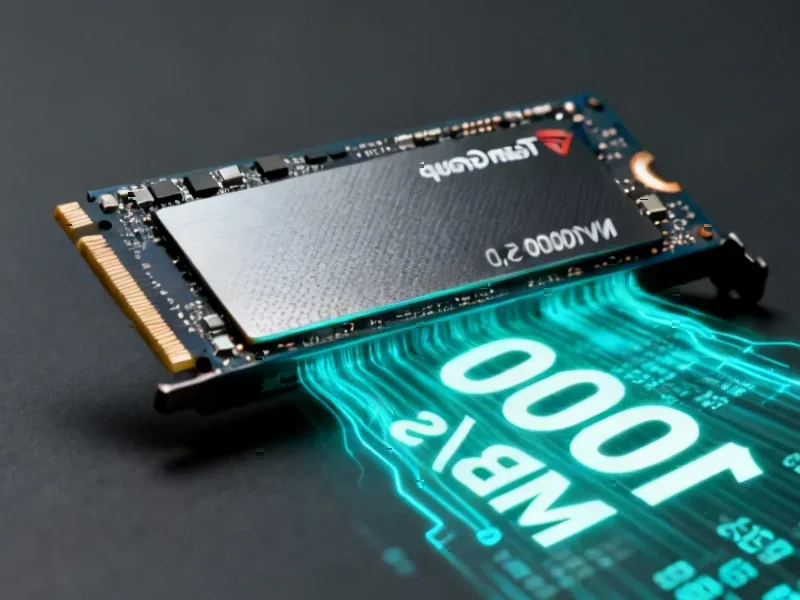According to Guru3D.com, Kingston Technology has expanded its FURY Renegade G5 SSD lineup with an 8TB model, completing a family that previously earned PCWorld’s “Editor’s Choice” award. The PCIe 5.0 NVMe M.2 2280 drive features a PCIe Gen 5 x4 controller with 3D TLC NAND memory, delivering sequential read speeds up to 14,800 MB/s and write speeds up to 14,000 MB/s while exceeding 2 million IOPS in random operations. Keith Schimmenti, Kingston’s SSD business manager, emphasized that the company aims to give power users more flexibility for both work and play. The expanded lineup now spans from 1TB to 8TB capacities, all backed by a five-year warranty and Kingston’s reliability reputation. This move represents a significant escalation in the consumer storage arms race.
Premium Storage Gets Competitive
Kingston’s 8TB entry fundamentally changes the competitive dynamics in the high-end SSD market. While Samsung and Western Digital have dominated the premium segment with their 4TB offerings, Kingston’s leap to 8TB at PCIe 5.0 speeds creates immediate pressure on competitors to match both capacity and performance. The timing is strategic—as game install sizes regularly exceed 200GB and professional video editors work with 8K raw footage, the demand for massive, fast storage has never been higher. This move positions Kingston to capture market share from professionals who previously had to choose between capacity and speed, often resorting to multiple drives or expensive enterprise solutions.
The Capacity-Price Equation Shifts
The introduction of an 8TB consumer SSD at these performance levels will inevitably create downward pricing pressure across the entire high-capacity segment. Historically, storage above 4TB carried significant price premiums that made them impractical for all but the most demanding users. Kingston’s entry into this space with a complete product family—from 1TB to 8TB—suggests they’ve achieved manufacturing efficiencies that competitors will struggle to match. This could trigger a price war in the 4TB+ category, benefiting consumers while squeezing margins for manufacturers who haven’t scaled their 3D NAND production as effectively.
Changing Professional Workflows
For content creators and data professionals, this capacity leap enables workflow transformations that weren’t previously practical. Video editors can now keep multiple 8K projects locally without constant file management, while data scientists can work with larger datasets without network storage bottlenecks. The combination of 14,800 MB/s speeds and 8TB capacity means professionals can treat these drives as both working storage and near-line archive simultaneously. This blurs the traditional hierarchy between fast system drives and slower mass storage, potentially simplifying workstation configurations and reducing total cost of ownership for high-performance computing setups.
The Thermal Reality Check
While the performance numbers are impressive, the thermal management requirements for sustained 14,800 MB/s operations at 8TB capacity cannot be overlooked. PCIe 5.0 drives generate significant heat, and maintaining performance without thermal throttling requires sophisticated cooling solutions that many consumer systems lack. Kingston’s success in this segment will depend not just on the drive’s specifications but on how well it manages heat during prolonged heavy workloads. This creates an opportunity for aftermarket cooling manufacturers while potentially limiting the drive’s appeal in compact systems where airflow is constrained.
What Comes Next in Storage
Kingston’s 8TB announcement signals that the consumer storage industry is accelerating toward capacities that were previously exclusive to enterprise markets. Within 18-24 months, we can expect to see 12TB and 16TB consumer SSDs becoming available, driven by continued 3D NAND layer scaling and improved controller efficiency. The real battleground will shift to endurance and reliability at these capacities, where the total bytes written over a drive’s lifetime becomes increasingly important. Kingston’s five-year warranty suggests confidence in their technology, but the market will ultimately judge whether consumer-grade components can handle enterprise-level workloads at these scales.




